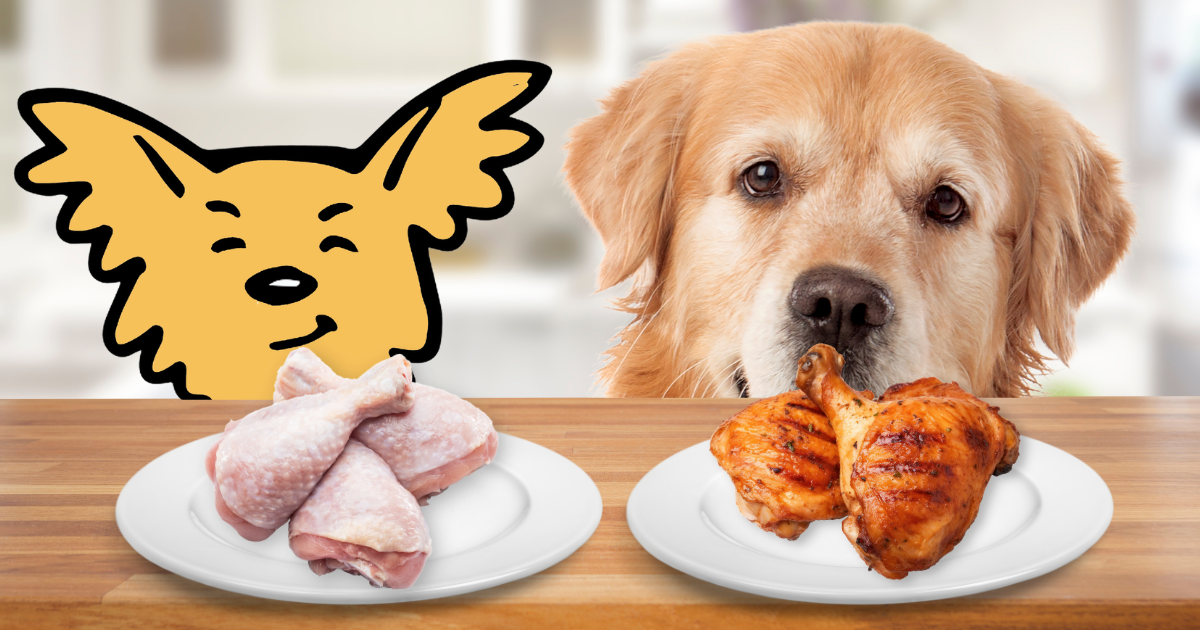
The Truth About Raw and Cooked Chicken: Can Dogs Eat It?
September 15, 2023Chicken is a popular food choice for humans, but what about our furry friends? As a dog owner, you want to provide your canine companion with a safe and nutritious diet. One common question that arises is whether dogs can eat chicken and, if so, whether it should be raw or cooked.
Understanding the benefits and potential risks of feeding chicken to dogs can help you make informed decisions about their dietary needs. So, let's explore the world of chicken and its implications for our furry friends.
Nutrients of Raw and Cooked Chicken for Dogs:
- Raw and cooked chicken is rich in high-quality proteins essential for muscle growth, repair, and immune support.
- Raw chicken contains vital amino acids, such as arginine and taurine, necessary for various bodily functions.
- Cooking alters the nutrient composition of chicken, affecting digestibility, availability of vitamins and minerals, and fatty acid profiles.
Can Dogs Eat Raw and Cooked Chicken?
Whether dogs can eat raw or cooked chicken is a common concern for many dog owners. Let's explore both options:

Raw Chicken: Dogs are descendants of wolves and, as such, have some tolerance for raw meat. However, feeding raw chicken to dogs comes with potential risks. Raw chicken can be contaminated with bacteria such as salmonella or campylobacter, which can cause foodborne illnesses in dogs. Furthermore, raw chicken bones can pose a choking hazard or lead to intestinal obstructions. It's crucial to consult with your veterinarian before feeding raw chicken to ensure you know the potential risks and can make an informed decision.

Cooked Chicken: Cooked chicken is generally safe for dogs if it is boneless, skinless, and properly cooked. Cooking chicken thoroughly helps eliminate harmful bacteria and reduces the risk of foodborne illnesses. However, avoiding seasoning, spices, and excessive salt is essential, as these can harm dogs. Additionally, cooked chicken bones should never be given to dogs, as they can splinter and cause serious internal injuries.

Salmon oil for dogs can be a beneficial addition to your dog's diet, whether you feed them raw or cooked chicken. Here's how to include it:
ᐧRaw Chicken: Mix a small amount of salmon oil with the raw chicken to provide extra omega-3 fatty acids for your dog's skin, coat, and overall health. Additionally, salmon oil's anti-inflammatory properties may help alleviate allergies in some dogs. Consult your vet for guidance.
ᐧCooked Chicken: Drizzle a small amount of salmon oil over cooked chicken to enhance flavor and offer the benefits of omega-3 fatty acids. Use boneless, skinless, and properly cooked chicken without seasoning. Salmon oil's anti-inflammatory properties can also assist in managing allergies.
Start with small amounts of salmon oil and gradually increase. Consult your vet for personalized advice on incorporating salmon oil into your dog's diet.
What to Consider Before Giving Your Dog Raw and Cooked Chicken
Health and Age Factors

Consider your dog's health conditions, immune system strength, and specific dietary restrictions. Puppies, seniors, and pregnant dogs may have different dietary needs. Consult your veterinarian for guidance tailored to your dog's requirements.
Handling and Preparation

Practice proper hygiene when handling raw chicken to minimize bacterial contamination risks. Ensure thorough cleaning of surfaces and utensils, and wash your hands afterward. When cooking chicken, remove bones and avoid harmful seasonings.
Portion Control and Balanced Diet

Chicken should be part of a balanced diet, not the sole focus. Consult a veterinarian or canine nutritionist to determine appropriate portions and ensure your dog receives a well-rounded diet.
Allergies and Sensitivities

Certain dogs may exhibit allergies or sensitivities toward chicken. Monitor your dog for any adverse reactions or digestive issues after introducing chicken into its diet.
Feeding Frequency

Consider how often you plan to incorporate chicken into your dog's meals. Maintaining a consistent feeding schedule is essential for their digestive health.
By considering these factors, you can make informed decisions about incorporating raw or cooked chicken into your dog's diet and ensure their well-being.
Conclusion
Feeding chicken to dogs can be a nutritious addition to their diet, but it's crucial to consider important factors and make informed decisions. While cooked chicken, without bones or harmful seasonings, is generally a safer choice, it's essential to consult with your veterinarian to determine the best approach for your dog. Regarding raw chicken, it's essential to weigh the risks and benefits and seek professional guidance.
